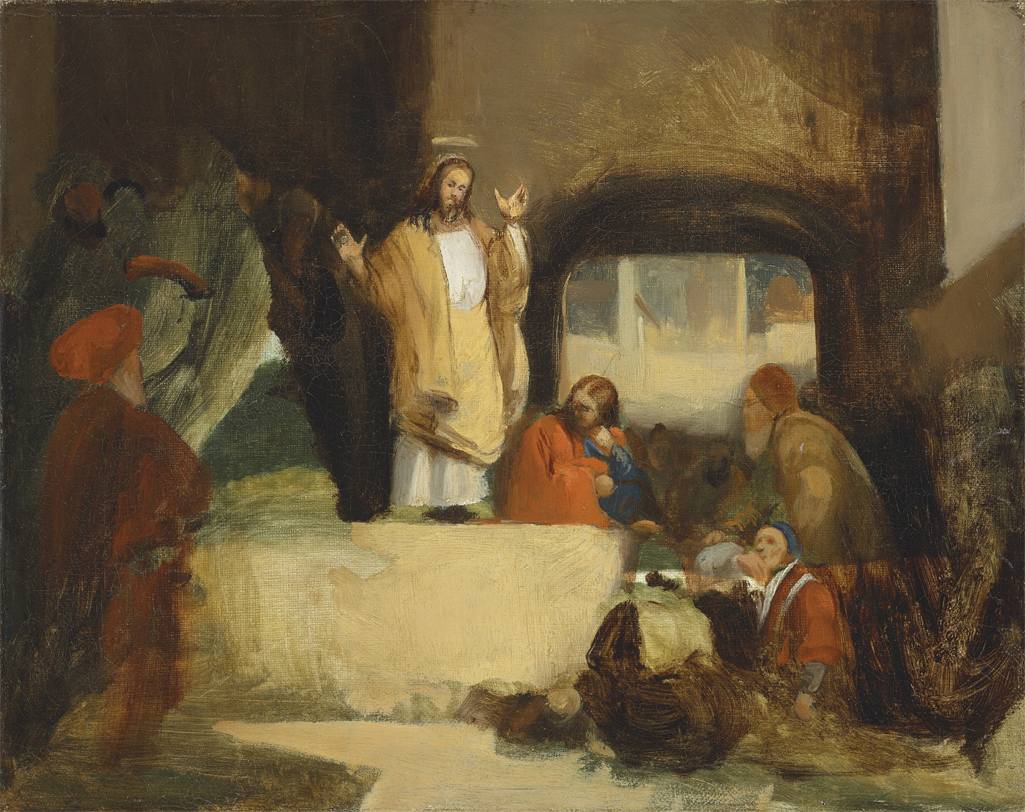Christian Art | Jesus Preaches The Gospel | Christian Faith
Office Of Readings | Week 17, Sunday, Ordinary Time | A Reading From The Homilies Of Saint John Chrysostom On The Second Letter To The Corinthians | Open Your Hearts To Jesus Christ
‘I am full of joy.’
Saint John Chrysostom’s homily on this passage from Saint Paul’s Second Letter to the Corinthians offers both a theological and pastoral meditation on Paul’s appeal for reconciliation. The homily reflects the Apostle Paul’s deep emotional connection to the Corinthian Christians and provides insight into early Christian understandings of love, leadership, and suffering. Saint Chrysostom draws out the human and divine dynamics at work in Paul’s relationship with the church, showing the warmth and vulnerability of a true apostle.
Historical And Cultural Context Of Paul’s Second Letter To The Corinthians
Corinth in the 1st century was a prominent Greek city, known for its commercial wealth, cultural diversity, and moral laxity. Paul founded the Christian community there around AD 50, but his relationship with the Corinthians was often turbulent. After his first letter (1 Corinthians), which addressed various divisions and moral failings, Paul made a painful visit and later wrote a letter ‘with many tears’ (2 Cor. 2:4), now lost, before composing what we call 2 Corinthians.
This background explains the urgency and emotional tone of 2 Corinthians 7. Paul had suffered misunderstanding and rejection from some in Corinth who were swayed by rival preachers—whom he sarcastically calls ‘super-apostles’ (2 Cor. 11:5). These individuals questioned Paul’s authority, mocked his weakness, and possibly accused him of lacking divine favour because of his suffering. Against this backdrop, Paul seeks not only to defend himself but to restore the mutual love between himself and the community.
Chrysostom’s Interpretation | Apostolic Love And Vulnerability
Chrysostom highlights how Paul, even in the act of correction, returns quickly to expressions of affection. ‘Open your hearts to us,’ Paul says, rather than ‘love us’, which Chrysostom notes is a more appealing and gentle form of request. The Greek term platynthete (πλατύνθητε) literally means ‘be enlarged’, suggesting that Paul is asking them to widen their inner space—to make room again in their hearts for him.
Chrysostom underscores this as a deliberate rhetorical and pastoral choice: Paul does not demand love, but invites it, reminding them of the mutual commitment he still holds: ’You are in our hearts, to die together and to live together.’ Chrysostom interprets this as the highest expression of love: not only a willingness to endure hardship for the beloved but to share one’s whole life and death with them.
What stands out in Chrysostom’s treatment is how he understands this passage as an example of love that does not diminish even when it is not returned in full. Paul, he says, does not accuse the Corinthians of failing to love him, but rather of not loving him ‘in the same measure’. This soft correction is described as being ‘tempered with much forbearance’, demonstrating the charity that covers even disappointment and injury.
Language And Textual Analysis
The Greek of 2 Corinthians 7:2–4 is rich in emotional resonance. The phrase ‘our heart is enlarged’ (ἡ καρδία ἡμῶν πεπλάτυνται) is not merely metaphorical; it conveys real openness, emotional generosity, and room for reconciliation. Chrysostom interprets this as a sign of love’s power: like heat expanding a vessel, love enlarges the human heart so it can contain many without division or loss.
Paul also uses such words as ‘I rejoice exceedingly’ and ‘in all our tribulations’ to express a paradox. Paul’s joy is not diminished by suffering; in fact, it is intensified by the Corinthians’ repentance and renewed affection. Chrysostom draws attention to this as evidence of Paul’s pastoral heart: his greatest consolation is not physical ease or external success, but the spiritual well-being of his people.
Theology Of Apostolic Ministry And Christian Love
Chrysostom sees in Paul a model of pastoral ministry defined by vulnerability, affection, and shared suffering. Paul’s openness is not simply emotional—it reflects his theological conviction that apostleship means bearing others’ burdens (cf. Galatians 6:2) and being poured out for their sake (cf. Philippians 2:17).
Paul does not separate teaching from personal relationship. Chrysostom cites other letters in which Paul expresses similar affections: to the Romans, his desire to visit; to the Galatians, his anguish ‘like a woman in labour’; to the Thessalonians, his image of a nursing mother. These references are not decorative but foundational. For Chrysostom, they prove that authentic ministry is deeply relational—it involves empathy, intercession, sacrifice, and even emotional suffering.
Furthermore, Chrysostom suggests that Paul’s joy amid tribulation is not irrational but a mark of divine love at work. The true apostle rejoices not in circumstances but in people being reconciled to God and to one another. Thus, Paul’s sorrow is turned to joy not because trials disappear, but because love prevails.

A Reading From The Homilies Of Saint John Chrysostom On The Second Letter To The Corinthians | Open Your Hearts To Jesus Christ
Again Paul turns to speak of love, softening the harshness of his rebuke. For after convicting and reproaching them for not loving him as he had loved them, breaking away from his love and attaching themselves to troublemakers, he again takes the edge off the reproach by saying: Open your hearts to us, that is, love us. He asks for a favour which will be no burden to them but will be more profitable to the giver than to the receiver. And he did not use the word ‘love’ but said, more appealingly: Open your hearts to us.
Who, he said, has cast us out of your minds, thrust us from your hearts? How is it that you feel constraint with us? For, since he has said earlier: You are restricted in your own affection, he now declares himself more openly and says: Open your heart to us, thus once more drawing them to him. For nothing so much wins love as the knowledge that one’s lover desires most of all to be himself loved.
For I said before, he tells them, that you are in our hearts to die together or live together. This is love at its height, that even though in disfavour, he wishes both to die and to live with them. For you are in our hearts, not just somehow or other, but in the way I have said. It is possible to love and yet to draw back when danger threatens; but my love is not like that.
I am filled with consolation. What consolation? That which comes from you because you, being changed for the better, have consoled me by what you have done. It is natural for a lover both to complain that he is not loved in return and to fear that he may cause distress by complaining too much. Therefore, he says: I am filled with consolation, I rejoice exceedingly.
It is as if he said, I was much grieved on your account, but you have made it up for me in full measure and given me comfort; for you have not only removed the cause for any grief but filled me with a richer joy.
Then he shows the greatness of that joy by saying not only I rejoice exceedingly but also the words which follow: in all my tribulations. So great, he says, was the delight that you gave me that it was not even dimmed by so much tribulation, but overcame by its strength and keenness all those sorrows which had invaded my heart, and took away from me all awareness of them.
Christian Prayer With Jesus Christ
Lord Jesus Christ,
you opened your heart to the world, bearing the wounds of love and sorrow for the sake of your people.
Grant us hearts that are wide and generous,
able to bear with one another, forgive, and seek reconciliation.
Teach us, like your Apostle Paul, to find joy even in affliction,
and to desire not to be served but to serve,
not to be loved only, but to love.
Fill us with the consolation that comes from restored relationships and shared faith,
that we may be one in heart and mind,
to the glory of God the Father.
Amen.
Glossary Of Christian Terms
2 Corinthians – A letter written by the Apostle Paul to the Christian community in Corinth, addressing issues of reconciliation, his apostolic authority, and the nature of Christian ministry.
Saint John Chrysostom (c. 349–407) – A renowned early Church Father and Archbishop of Constantinople, known for his eloquent preaching (his name means ‘golden-mouthed’) and deep pastoral insight.
Platynthete (πλατύνθητε) – Greek word used in 2 Corinthians 6:13 and alluded to in 7:2, meaning ‘be enlarged’ or ‘make room’; metaphor for emotional openness or generosity of heart.
Apostolic ministry – The service and leadership role carried out by the apostles, marked by proclamation of the Gospel, personal sacrifice, and deep pastoral care.
Forbearance – Patient restraint and tolerance, especially in the face of provocation or disappointment; here, Paul tempers his correction with gentleness.
Reconciliation – The restoration of right relationship, especially between God and humanity, or within a Christian community. A key theme in 2 Corinthians.
Tribulation – A term used frequently in Paul’s letters, referring to suffering, persecution, or trials undergone for the sake of the Gospel.
Pastoral – Relating to the care and guidance of others, especially within a Christian context; often involving personal, emotional, and spiritual support.








